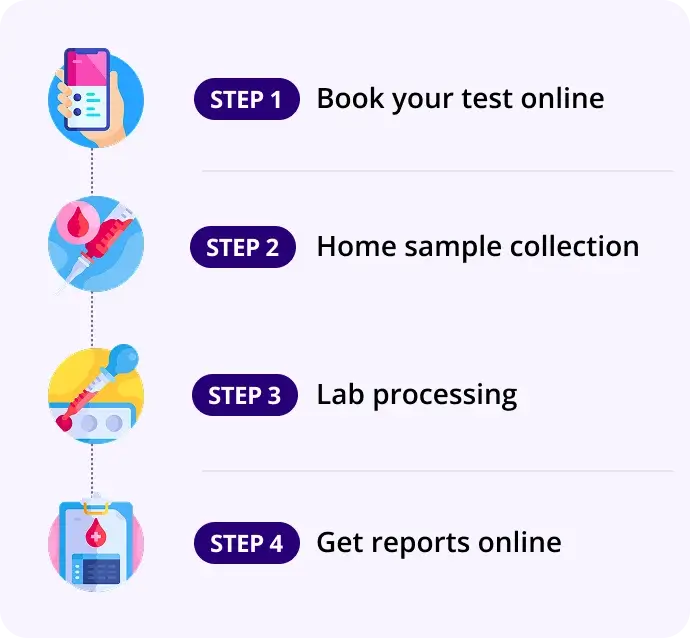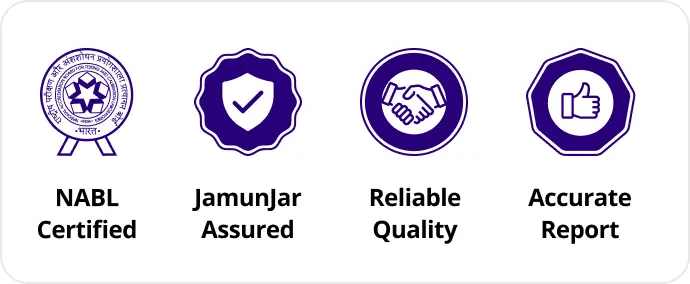Search for
Chloride
Kidney
Report in 4Hrs
At Home
No Fasting Required
Details
Investigate electrolyte imbalance, Evaluate kidney function, Assess dehydration or fluid overload, Monitor patients on IV fluids, diuretics, or dialysis
₹69₹275
75% OFF
FREE:
Ai Insights
Chloride Test Information Guide
- Why is it done?
- Measures the level of chloride, a negatively charged electrolyte found primarily in extracellular fluid and blood plasma
- Assesses electrolyte balance and acid-base status in the body
- Evaluates kidney and adrenal gland function
- Part of routine metabolic panel (BMP) or comprehensive metabolic panel (CMP) screening
- Ordered when patients present with symptoms of electrolyte imbalance such as weakness, confusion, or abnormal heart rhythm
- Monitors patients with chronic conditions affecting fluid and electrolyte balance (kidney disease, heart failure, diabetes)
- Performed during hospital admission, emergency evaluation, or when starting medications that affect electrolytes
- Normal Range
- Normal serum chloride range: 98-107 mEq/L (milliequivalents per liter) or 98-107 mmol/L (millimoles per liter)
- Reference ranges may vary slightly between laboratories; always consult the specific reference range provided by your testing facility
- Interpretation: • Normal (98-107 mEq/L): Indicates proper electrolyte balance and kidney function • Low chloride (hypochloremia, <98 mEq/L): May indicate excessive fluid loss, vomiting, or medication effects • High chloride (hyperchloremia, >107 mEq/L): May indicate dehydration, kidney dysfunction, or excessive sodium intake
- Chloride levels must be considered in conjunction with other electrolytes (sodium, potassium, bicarbonate) and clinical context
- Interpretation
- Low Chloride (Hypochloremia): • Causes: Vomiting, diarrhea, diuretic use, adrenal insufficiency, respiratory alkalosis, syndrome of inappropriate antidiuretic hormone (SIADH), cystic fibrosis • Symptoms: Muscle weakness, lethargy, confusion, irregular heartbeat • Clinical significance: Often indicates acid-base and fluid balance abnormalities
- High Chloride (Hyperchloremia): • Causes: Dehydration, kidney disease, diarrhea with bicarbonate loss, hyperparathyroidism, diabetes insipidus, excessive normal saline administration • Symptoms: Thirst, confusion, lethargy, weakness • Clinical significance: Often associated with metabolic acidosis or dehydration
- Factors affecting chloride levels: • Medications (diuretics, corticosteroids, NSAIDs) • Fluid intake and output • Respiratory and metabolic disorders • Gastrointestinal losses • Kidney function status • Dietary sodium and fluid intake
- Chloride-responsive vs. chloride-resistant conditions determine treatment approach
- Chloride often parallels sodium levels but may differ in certain pathological conditions
- Associated Organs
- Primary organ systems involved: • Kidneys: Regulate chloride reabsorption and excretion; critical role in electrolyte balance • Lungs: Affect acid-base status which influences chloride levels • Gastrointestinal tract: Major source of chloride loss or abnormal absorption • Adrenal glands: Produce aldosterone which regulates sodium and chloride reabsorption • Heart: Chloride imbalance can cause arrhythmias • Brain: Pituitary gland regulates vasopressin (ADH) affecting water and electrolyte balance
- Common conditions associated with abnormal chloride: • Chronic kidney disease • Congestive heart failure • Liver cirrhosis • Diabetes mellitus • Hypertension • Metabolic and respiratory acid-base disorders • Adrenal insufficiency or excess • Cystic fibrosis • Dehydration and overhydration states
- Potential complications of abnormal chloride levels: • Severe hypokalemia with cardiac arrhythmias • Seizures from severe electrolyte imbalance • Muscle paralysis • Respiratory failure from muscle weakness • Altered mental status and coma • Cardiovascular collapse in severe cases
- Follow-up Tests
- Recommended follow-up tests based on abnormal results: • Serum sodium level: Assess overall electrolyte balance and determine if fluid overload or dehydration exists • Serum potassium: Often abnormal concurrently; critical for cardiac function • Serum bicarbonate: Evaluate acid-base status • Blood gas analysis (ABG): Assess respiratory and metabolic acid-base disorders • Creatinine and Blood Urea Nitrogen (BUN): Evaluate kidney function • Urine chloride: Assess renal handling of chloride; helps differentiate causes of abnormality
- Additional diagnostic investigations: • Osmolality (serum and urine): Assess hydration status and SIADH • Thyroid function tests (TSH, Free T4): If SIADH suspected • Chest X-ray: To evaluate for pulmonary disease causing acid-base changes • Cortisol and ACTH levels: If adrenal insufficiency suspected • Electrocardiogram (ECG): If cardiac arrhythmias suspected from electrolyte imbalance
- Monitoring frequency: • Acute situations (hospitalization): Daily or twice-daily checks until stabilized • Chronic conditions: Every 3-6 months during routine follow-up • After medication changes: 1-2 weeks post-adjustment • After treatment initiation: As recommended by healthcare provider based on underlying condition
- Fasting Required?
- Fasting required: No
- The chloride test can be performed on a random blood sample at any time of day without fasting requirements
- Patient preparation instructions: • No special dietary restrictions before the test • Continue taking all regular medications unless specifically instructed otherwise • Stay well-hydrated on the day of testing (drink water as usual) • Avoid excessive salt intake on the day before if possible, though not strictly necessary • Inform healthcare provider of any recent medication changes • Report symptoms of electrolyte imbalance (weakness, confusion, nausea) to your provider before testing
- Medications that may affect chloride levels (do not stop without medical advice): • Diuretics (loop and thiazide) • ACE inhibitors and ARBs • NSAIDs • Corticosteroids • Anticonvulsants • Lithium
- Sample collection: Blood draw from venipuncture, typically 5-10 mL; no special tube required unless part of larger metabolic panel
How our test process works!

